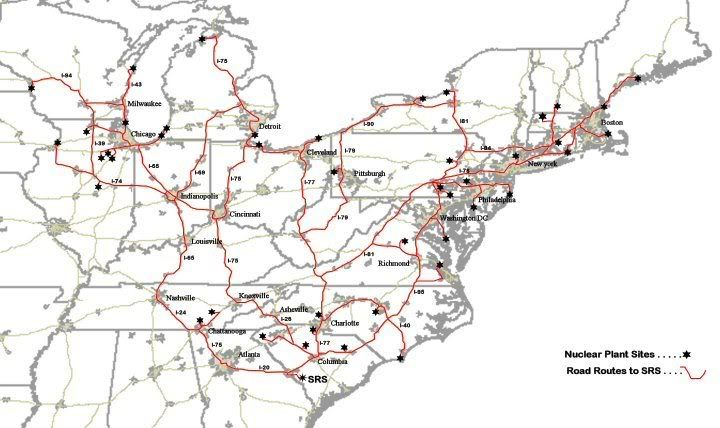'Mobile Chernobyl' Southbound?
The Bush administration's plans for creating an international partnership to reprocess spent nuclear fuel could result in large quantities of radioactive waste being hauled through Southern communities via truck, train or ship.
 So reveals a set of maps unveiled today by community groups working with the Nuclear Information and Resource Service, a national nuclear watchdog group with offices in suburban Washington and Asheville, N.C. The maps show possible transportation routes that high-level radioactive waste would take from nuclear power reactors to South Carolina's Savannah River site, a federal nuclear processing center located near Augusta, Ga. (The map at left shows potential road routes; click on it for a larger image.)
So reveals a set of maps unveiled today by community groups working with the Nuclear Information and Resource Service, a national nuclear watchdog group with offices in suburban Washington and Asheville, N.C. The maps show possible transportation routes that high-level radioactive waste would take from nuclear power reactors to South Carolina's Savannah River site, a federal nuclear processing center located near Augusta, Ga. (The map at left shows potential road routes; click on it for a larger image.)
The U.S. Department of Energy is currently considering the Savannah site and 10 others across the nation for a project known as the Global Nuclear Energy Partnership, which promotes nukes as the economical answer to the nation's energy and climate woes -- a claim that numerous experts have challenged. GNEP locations being considered in the South also include Barnwell, S.C.; East Tennessee; and Paducah, Ky.; other possible sites are located in Illinois, Ohio, Washington, and two each in Idaho and New Mexico.
The GNEP would redirect planned transport of the nation's commercial reactor waste from the controversial Yucca Mountain site in Nevada. Reactors currently store their waste on site. In all, GNEP would move radioactive waste from 75 sites in 33 states.
John Sticpewich created the maps using DOE data for NIRS' Asheville-based Common Sense at the Nuclear Crossroads campaign as part of a report on problems with transport and reprocessing of nuclear waste in the Carolinas. Due to limited resources, the new maps show only those waste sites east of the Mississippi River and from the Carolinas northward.
"Credit analysts on Wall Street have suggested that moving the accumulated high-level waste from the reactor sites would make investment in new nuclear power more likely," says Sticpewich. "This report documents the huge tonnage of radioactive waste that must be dealt with, the very high costs of transporting it, and the potential for impact that such a move would have on hundreds of communities along the way."
NIRS coined the term "Mobile Chernobyl" when Congress was considering shipping highly radioactive waste to Nevada in order to evoke the specter of disasters like the 1986 catastrophe in the Ukraine. NIRS also points to the potential risk of terror attacks on waste shipments at the very time the nuclear industry is pushing for a dramatic expansion.
"There are 32 new reactors moving forward, and of these 30 are in the South," says Mary Olson of NIRS' Asheville office. "Now if GNEP goes forward, more of the real cost of those new nuclear power reactors will be clear: Nuclear waste would stay here in the South and more would come from all over the country -- and possibly the world."
Tags
Sue Sturgis
Sue is the former editorial director of Facing South and the Institute for Southern Studies.
